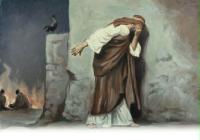 The Sincerity of Love
The Sincerity of Love

In this article, first published in March 1947, we are challenged to examine ourselves as to whether we are truly motivated by what God has done for us to live lives of loving and obedient service.
Actions rather than professions are the true measure of our love for Christ. Though our tongue, as the Apostle James reminds us, “is a little member, it boasteth great things” (Jas. 3:5) and may deceive us more easily than it does our friends. Professions of love and allegiance, if they are unsupported by authoritative works, if they fail to take the strains of everyday living, are easy, ignoble and disastrous.

Although the experience became the starting point of a stronger loyalty, Peter discovered this in the most tragic circumstances. In all the Scriptures it would be difficult to find nobler assurances than those which Peter gave his Lord: “Lord, I am ready to go with thee, both into prison, and to death” (Luke 22:33). Yet what can be weaker than his pitiful blustering a few hours later: “Then began he to curse and to swear, saying, I know not the man” (Matt. 26:74) ? We have a happy contrast in the example of a woman who loved her Lord with all the intensity of her soul, but who did not confess it. Her confession was hidden in her actions as she symbolically prepared Christ for his burial, and it was Jesus who declared to men both her love and her comprehension.
Jesus warns us
On so many occasions, sometimes directly, sometimes obliquely, Jesus warns us of the danger of mere profession. His great criticism of the scribes and Pharisees was that they had inherited the fault of their fathers, who drew nigh to God with their mouth and honoured Him with their lips, but their heart was far from Him (Matt. 15:7,8).
His great discourse on the mount concludes with sober words of warning. For a moment he lifts the veil of the future and discloses the judgement seat. There are those who are still protesting with the greatest emphasis that they have loved and worked; they have “prophesied”, they have “cast out devils”, they have “done many wonderful works”. But the thoughts and intents of their hearts are known to him and, however they may plead their loyalty, the evidence of their profession is lacking: “Not every one that saith unto me, Lord, Lord…. But he that doeth the will of my Father” (7:21). Professions of love and allegiance may sound strong and brave now, they may even allow us to enjoy the pale light of men’s approval, but if they are only supported by idle, unprofitable lives the day will come when their hollow vanity will be disclosed, and the end will be shame and contempt.
The word “many” in Matthew 7:22 is disturbing. It will not be one here and there who will vainly protest. Most of us will discover in that little word a challenge to search carefully into our own hearts. We shall be stirred to demand whether our actions are rising to the standard of our professions. There is a world of difference between active and lethargic religion, between those who accept only the obligations of service that come their way and those who spend their lives creating opportunities of service. If our service to God in its practical field, our relation with man, is uninspired and inactive, there is a very real danger that our allegiance has degenerated into the mere acknowledgement of our lips.
In the graphic language of the writer to the Hebrews, we are “compassed about with (a) great … cloud of witnesses” (12:1), and the more searching our penetration into their lives, the greater our conviction that their works were a natural reflection of their faith; their election was a vigorous incentive to service. They were “workers together with (God)” (2 Cor. 6:1).
Yet our self-examination must not end with the determination of whether our service is active or lethargic. In an active and even a brilliant service which appears to be directed towards the glory of God and the edification of men, there may lurk a motive of self-satisfaction rather than of self-surrender. There are many subtle yet grimly real obstacles which may cast shadows across our actions: “all things are naked and opened unto the eyes of Him with Whom we have to do” (Heb. 4:13). He discerns, but we must examine and discover our true motives, however worthy our actions may appear.
Our incentive
What is the secret of this active, vigorous discipleship that is nothing less than a transformation? What is the source from which it flows? Whence come its incentive and its power? Paul’s answer is that it lies in an appreciation of the mercies of God. In his Epistle to the Romans he gives a vivid portrayal of the drama of salvation. He speaks of the hopelessness of both Jew and Gentile, of righteousness, sanctification and final redemption. We follow him through his exposition of the grace of God, and meet his exhortation: “I beseech you therefore, brethren, by the mercies of God, that ye present your bodies a living sacrifice, holy, acceptable unto God, which is your reasonable service” (Rom. 12:1).
This is the process throughout the Scriptures; a revelation of God’s purpose with its inescapable emphasis upon the love of God, and then an exhortation to walk in the light and power of that love. The “manner of love the Father hath bestowed upon us, that we should be called the sons of God” (1 John 3:1) must have a powerful transforming effect upon every sincere believer, and evoke an active and loving response reflected in our thoughts, words and actions. This is the only source of true service. Thus, in his epistle, John speaks of our lifelong struggles in simple words: “Hereby,” he says, “know we love, because he laid down his life for us: and we ought to lay down our lives for the brethren” (1 John 3:16 RV).
Our faith therefore must be a “faith which worketh by love” (Gal. 5:6). Our zeal must be the zeal of a responsive gratitude in our hearts. It has its source in a deep and abiding consciousness that we were strangers afar off, and we have been brought near to God through the life and sacrifice of Christ. If we truly feel this release from sin and this adoption into the family of God we shall show it in our actions. Our service will have in it both the humility of repentance and the “imperturbable patience of faith”. We are conscious, as we rise from the waters of baptism, of wider horizons; a prospect of unlimited spiritual progress with Divine resources to strengthen us and the perfect example and precepts of the Son of God to guide us. If a strong and abiding sense of God’s love, and a steady faith in His redemptive purpose, are the foundation upon which our life is built, there will be no danger of insincerity; we shall not serve God with our eyes fixed upon the opinions and censures of men; our public actions will be a true reflection of our private devotions. In short, we shall not love in word and tongue but in deed and truth. The love of God, which was manifested in every word and action of our Master, will flow on deep, and strong in our lives, and nothing will be able to separate us from it, because in all the varied circumstances of life we shall be “more than conquerors through him that loved us.” (Romans 8:37).
Bro Melva Purkis



